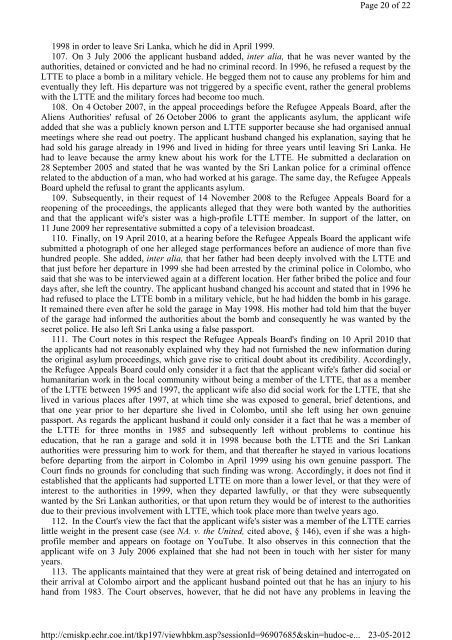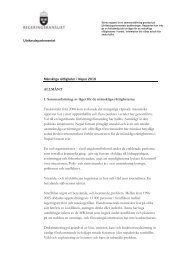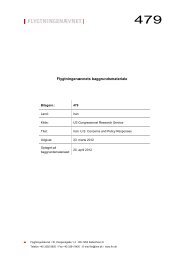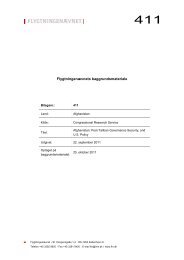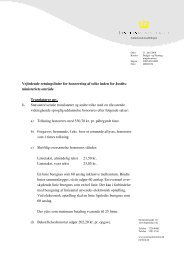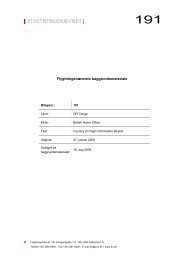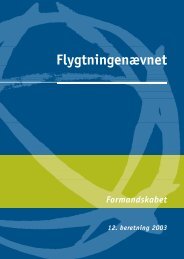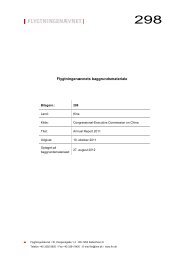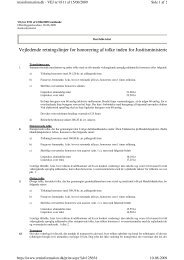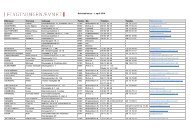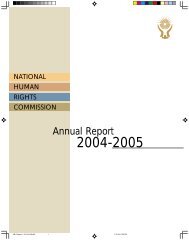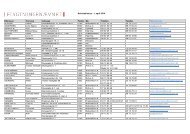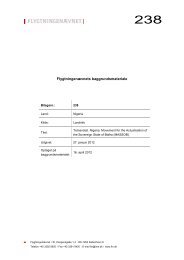FIFTH SECTION CASE OF S.S. AND OTHERS v ... - Flygtningenævnet
FIFTH SECTION CASE OF S.S. AND OTHERS v ... - Flygtningenævnet
FIFTH SECTION CASE OF S.S. AND OTHERS v ... - Flygtningenævnet
You also want an ePaper? Increase the reach of your titles
YUMPU automatically turns print PDFs into web optimized ePapers that Google loves.
http://cmiskp.echr.coe.int/tkp197/viewhbkm.asp?sessionId=96907685&skin=hudoc-e...Page 20 of 2223-05-20121998 in order to leave Sri Lanka, which he did in April 1999.107. On 3 July 2006 the applicant husband added, inter alia, that he was never wanted by theauthorities, detained or convicted and he had no criminal record. In 1996, he refused a request by theLTTE to place a bomb in a military vehicle. He begged them not to cause any problems for him andeventually they left. His departure was not triggered by a specific event, rather the general problemswith the LTTE and the military forces had become too much.108. On 4 October 2007, in the appeal proceedings before the Refugee Appeals Board, after theAliens Authorities' refusal of 26 October 2006 to grant the applicants asylum, the applicant wifeadded that she was a publicly known person and LTTE supporter because she had organised annualmeetings where she read out poetry. The applicant husband changed his explanation, saying that hehad sold his garage already in 1996 and lived in hiding for three years until leaving Sri Lanka. Hehad to leave because the army knew about his work for the LTTE. He submitted a declaration on28 September 2005 and stated that he was wanted by the Sri Lankan police for a criminal offencerelated to the abduction of a man, who had worked at his garage. The same day, the Refugee AppealsBoard upheld the refusal to grant the applicants asylum.109. Subsequently, in their request of 14 November 2008 to the Refugee Appeals Board for areopening of the proceedings, the applicants alleged that they were both wanted by the authoritiesand that the applicant wife's sister was a high-profile LTTE member. In support of the latter, on11 June 2009 her representative submitted a copy of a television broadcast.110. Finally, on 19 April 2010, at a hearing before the Refugee Appeals Board the applicant wifesubmitted a photograph of one her alleged stage performances before an audience of more than fivehundred people. She added, inter alia, that her father had been deeply involved with the LTTE andthat just before her departure in 1999 she had been arrested by the criminal police in Colombo, whosaid that she was to be interviewed again at a different location. Her father bribed the police and fourdays after, she left the country. The applicant husband changed his account and stated that in 1996 hehad refused to place the LTTE bomb in a military vehicle, but he had hidden the bomb in his garage.It remained there even after he sold the garage in May 1998. His mother had told him that the buyerof the garage had informed the authorities about the bomb and consequently he was wanted by thesecret police. He also left Sri Lanka using a false passport.111. The Court notes in this respect the Refugee Appeals Board's finding on 10 April 2010 thatthe applicants had not reasonably explained why they had not furnished the new information duringthe original asylum proceedings, which gave rise to critical doubt about its credibility. Accordingly,the Refugee Appeals Board could only consider it a fact that the applicant wife's father did social orhumanitarian work in the local community without being a member of the LTTE, that as a memberof the LTTE between 1995 and 1997, the applicant wife also did social work for the LTTE, that shelived in various places after 1997, at which time she was exposed to general, brief detentions, andthat one year prior to her departure she lived in Colombo, until she left using her own genuinepassport. As regards the applicant husband it could only consider it a fact that he was a member ofthe LTTE for three months in 1985 and subsequently left without problems to continue hiseducation, that he ran a garage and sold it in 1998 because both the LTTE and the Sri Lankanauthorities were pressuring him to work for them, and that thereafter he stayed in various locationsbefore departing from the airport in Colombo in April 1999 using his own genuine passport. TheCourt finds no grounds for concluding that such finding was wrong. Accordingly, it does not find itestablished that the applicants had supported LTTE on more than a lower level, or that they were ofinterest to the authorities in 1999, when they departed lawfully, or that they were subsequentlywanted by the Sri Lankan authorities, or that upon return they would be of interest to the authoritiesdue to their previous involvement with LTTE, which took place more than twelve years ago.112. In the Court's view the fact that the applicant wife's sister was a member of the LTTE carrieslittle weight in the present case (see NA. v. the United, cited above, § 146), even if she was a highprofilemember and appears on footage on YouTube. It also observes in this connection that theapplicant wife on 3 July 2006 explained that she had not been in touch with her sister for manyyears.113. The applicants maintained that they were at great risk of being detained and interrogated ontheir arrival at Colombo airport and the applicant husband pointed out that he has an injury to hishand from 1983. The Court observes, however, that he did not have any problems in leaving the


